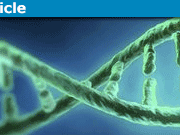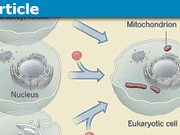Evolution Frequently Asked Questions for Beginners
Table of Contents
Key Points
- Evolution is a theory, which is the foundation of science 2. Evolution is the most rational explanation for the existence of life
- Creationism stems from denial and dogma, not evidence
- Intelligent Design is an attempt to shoehorn a God into the theory of evolution
- Evolution does not necessarily clash with religion
- The second law of thermodynamics does not rule out evolution
- Continuous evolution is Darwin‘s original concept, while intermittent evolution is evolution caused by changes in circumstance
- Gaps in the fossil record are due to the low probability of fossilization and tectonic movement of layers of sedimentary rock
- The Holocaust was not caused by evolution but by egotism and fanaticism
- Humans are still evolving, though the next step is uncertain 11. Evolution tells us the how, not the why of life – meaning must be found through religion or by creating one‘s meaning
Isn’t evolution just a theory?
A: As opposed to what? Yes, evolution is just a theory, but theories are the foundations of the idea of science. We can never really prove evolution. In the absence of a time machine, it is impossible to check evolution occurs. However, we can see that evolution provides the most rational explanation for the existence of life and is best supported by the available evidence. The important part of science is that at any time, we will never know everything. But as a theory, evolution is as close as we can currently get. If we judge evolution on the evidence, it is much more probable that evolution does occur than does not.
Isn’t the idea life came from random chance improbable?
A: True. It is indeed greatly unlikely for life to have occurred in the form we see today. But this misses out on some things. First, because there is no goal for evolution, humans do not necessarily have evolved. Thus, you can’t say that because x and y are the way they are, this is evidence for divine intervention, because they don’t have to be the way they are. Life could just as easily have evolved with silicon-based life forms, for example. Indeed, we do not have a proper definition of life to judge as criteria for the chance. Secondly, evolution is not a lottery, but a process of gradual building up. You don’t have to get everything right in one go, but just happen once and be preserved. Thirdly, the universe is huge, and there may have been multiple universes. This gives a larger chance for life to appear. Finally, just because something is improbable doesn’t mean it necessarily does not happen. Some of this falls into abiogenesis, how living things came from non-living objects. Even in this case, some inorganic evolution does occur. A self-replicating chemical can easily dominate early worlds. New evidence from ancient rocks also suggests that the surface conditions on early Earth may not be as hostile as you think, while places like the Kuiper Belt or the Oort Cloud are good locations for the early development of chemicals such as amino acids.
Still not convinced? Look at the alternative – creationism. Unlike evolution, which is supported by evidence and perfected by peer review, creationism stems from denial of dogma and misplaced faith. To support creationism is to throw out the logic for an irrational argument. To deny the vast majority of evidence. To be subjective rather than objective. Evolution is the only scientific answer to life.
What about Intelligent Design?
A: Intelligent design is the idea that life was created by evolution, but crucially with God controlling it for some sort of higher purpose. But there are several problems with this idea. First, the necessity of some sort of purpose implies that all the history of evolution went towards achieving this purpose. But this is entirely inconsistent with the idea of evolution as a process of constant progress, and the previous facts of the evolutionary dead ends, etc. Secondly, there is no evidence for intelligent design. The only suggestion is from the low probability of achieving current conditions, but this is itself born of attributing false significance to the way things are now. Thirdly, random processes alone are sufficient to account for the creation of complex life, while evolution does not present itself as an efficient way for an omnipotent god to create man. In the end, ID is an attempt to shoehorn a homocentric God into the theory of evolution, and thus unlike evolution is not for the foreseeable future, valid science.
Is evolution anti-god?
A: Not necessarily. This is a mistake many creationists make. The fact is, the majority of theists across the world do believe in evolution. With the Judeo-Christian god, for example, there is nothing in Genesis that rules out evolution as the method by which a divine god “created” life, or to have God as a passive bystander while evolution occurred. Evolution can co-exist relatively harmoniously with religion. What evolution does is make it unnecessary for God to exist to create life? For atheists and agnostics, this can be used as a disproof of god, but to say all evolutionists are atheists is completely wrong.
Doesn’t the second law of thermodynamics rule out evolution?
A: Nope. This stems from a fundamental misunderstanding about the second law. The second law states that in a closed system, the amount of entropy (disorder) can only increase. There are several problems with applying this to evolution.
First, the earth is far from a closed system. It is clear with every morning that the sun provides a constant input of energy to the world.
Secondly, the thermodynamic disorder is not the opposite of evolutionary complexity. Rather, complexity makes life in some ways acquire greater entropy. It is an interesting observation that some of man’s greatest achievements have been in the sector of power, degrading stored potential to waste heat. Just as convection currents may develop, complexity in evolution can be related to the disorder, not opposed.
Finally, there is the matter of scale. The second law does allow temporary order, as long as there is eventual disorder. When eventually all things decay, and when the Earth is destroyed, any entropy debt will be paid for in full.
What is the difference between continuous evolution and intermittent evolution?
A: When Darwin originally conceived the theory of evolution, he thought of evolution as a process of ever upwards, all the time. However, a rival theory has appeared where evolution occurred when changes in circumstance forced species to adapt. This is best evidenced by the fact that many new species appeared when major natural disasters occurred. For example, a rash of mammalian development happened after the mass extinction which destroyed the dinosaurs. This is intermittent evolution.
In reality, it may be a combination of the two that occur. We may have a background case of evolution from the constant selectional pressures such as food etc, but an increase in the rate of evolution when sudden changes in conditions increase the pressure to adapt and survive.
What about gaps in the fossil record? Lack of clear transitional timeline?
A: One of the problems people find with evolution is that we don’t get one clear line of fossils showing all the stages of evolution between one form and the next. However, this is a hopelessly naive concept. In reality, the probability of fossilization is very small. Most skeletons are destroyed by decay or weathering. The covering that allows the slow decay necessary scarcely ever occurs. And even if it is fossilized, due to the slow tectonic movement of layers of sedimentary rock, many parts of the fossil record are buried and thus inaccessible. Hence, the fossils we find are a tiny proportion of species that have existed. The populations of species vary with other factors like the population of predators, and so it is certain that we would find fossils of some species than other. As detailed before, the rate of evolution may vary, and some adaptations might occur too quickly to be seen by fossil evidence. The fact that we find new species of dinosaurs, simians, etc all the time shows that even if now we do not have a certain transitional form, we may eventually. Finally, the transitional species we do find, indeed all of the fossil records we do have, are perfectly consistent with evolution. Geologists have even so far as to use fossil evidence and evolutionary theory to date rock formations, comparing the fossils found in the vicinity with known fossilized species dated by other methods before and after.
Was evolution responsible for the Holocaust?
A: Ethnic cleansing, religious strife, and scapegoating have happened since the birth of civilization. While the massacres and genocides of the last world war used the ideas of natural selection as their excuse, it was not evolution that was ultimately responsible. In the end, it was the case of egotism, fanaticism, and aggressive nationalism that spawned such horrors. To claim it was the higher desire to further the superior race was simply the fashion of the day. Darwin saw things very differently from these – he saw evolution as a vessel of hope, that nature values ethics, civilized virtues, and social cooperation rather than aggression, brutality, and ruthlessness. Compassion and conscience are advantages, not weaknesses. The dictators of the past century never understood this point. Some scientists were responsible for much of the atrocities, but to condemn the science is foolish. Science is and always will be neutral, a tool to be used by the wise or unwise.
Are humans still evolving?
A: Indubitably. Evolution is a process without absolutes, without an end product. Even if temporary pauses exist and there are evolutionary dead ends, to be successful, all life adapts. Mankind is not immune from the triumvirate of random chance, heredity, and selection. So what’s the next step in human evolution? Hard to tell really. Probably increased intelligence, though certain US studies into obesity suggest otherwise. :)
What is the meaning of life?
A: Evolution tells us the how, not the why. Indeed, there does not need to be a why. To find meaning, you can either turn to religion or make your own meaning for life… Evolution is about the process, not the goal… It’s the journey that matters, not what’s at the end of it…
I have a BS in Information Sciences from UW-Milwaukee. I’ve helped manage Physics Forums for over 22 years. I enjoy learning and discussing new scientific developments. STEM communication and policy are big interests as well. Currently a Sr. SEO Specialist at Shopify and writer at importsem.com








Leave a Reply
Want to join the discussion?Feel free to contribute!